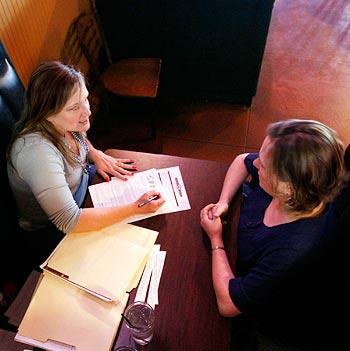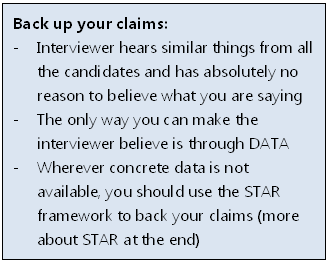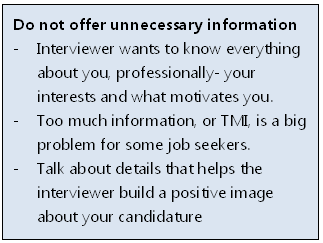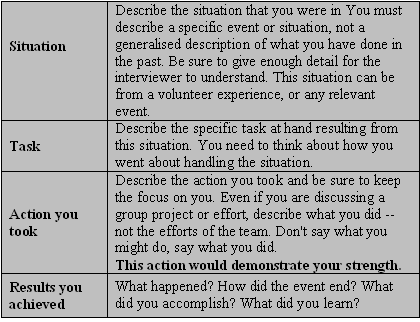
In the second part of the series (on mistakes that candidates make during an interview), Amit Bansal of PurpleLeap.com lists more examples and advises aspiring candidates on how to avoid these pitfalls.
For the benefit of first time readers, let me introduce you the two characters of this series. The first person is the Interviewer who is responsible for getting the right person for his organisation. The other character in this series is actually not just one person. This character is a job seeker who holds a professional degree and wants to get a job as soon as possible. Let's just call this person the Candidate.
In this series, I am going to share the experiences of the interviewer with various candidates. All these candidates belong to the category of 0-1 year work-experience. This series is aimed at giving you the interviewer's perspective on the interview process. I will be taking out excerpts from actual interviews and then share the viewpoint of the interviewer. The interviewer's comments will be interweaved in the interview itself.
In Interview 1 and Interview 2, I discussed the following parameters:
Let's go through the third interview in this series.
In this interview, we will learn a little more about how to build credibility with the interviewer. I am going to specifically talk about the section where the interviewer tries to figure out the specific things that the candidate is good at- essentially finding out what does this candidate bring to the table.
The candidate had mentioned the following as part of her resume:
Strengths:
Interview 3
After the usual pleasantries, we started with specific questions about the candidate.
Interviewer: Shruti, can you tell me your biggest strengths.
Candidate: Sir, I am hard working and a team worker. I am also having a positive attitude.
Interviewer comments: The candidate is not saying exactly what she has written in the resume. However, there are a couple of traits that she has mentioned in the resume as well.
The author is the CEO of PurpleLeap (http://www.purpleleap.com/) an employability skill enhancement initiative of Educomp Solutions Pvt Ltd.

 Interviewer: Shruti, tell me why you think that you are a team worker.
Interviewer: Shruti, tell me why you think that you are a team worker.
Candidate: Sir, I was a part of the volleyball team and I was also a part of Parivartan.
Interviewer: What is Parivartan.
Candidate: Parivartan is our annual festival. I was part of the team that did all the informal events. I was managing the Lucky 7 stall as well. We had lot of crowd at our stall. Our stall was the biggest attraction of Parivartan. We had profits of over Rs 12,000 in the two days of the event.
Interviewer: But tell me how you are a team worker?
Candidate: Sir, in the Lucky 7 stall we were a team of three people and I was working in that team.
Interviewer comments: The candidate is saying things that are not really supporting the claim of being a team worker. The candidate is describing the event but unfortunately those incidents are not related to the 'team worker' trait.
Interviewer: Give me some instance where you demonstrated hard working nature.
Candidate: Sir, I am generally hard working. I work hard on a day to day basis. I had worked hard in my college as well.
Interviewer: Tell me what you did in the college that proves that you are a hard working student.
Candidate: I was a part of the volley ball team and we used to have two hours of practice every day. Apart from the college, I used to spend those two hours every day.
Interviewer: Any other instance of your hard work.
Candidate: In my last term, I had a project. To finish the project we were left with only three days. I worked for 10 hours everyday and completed the project.
Interviewer comments: The candidate has still not been able to demonstrate the strength and I am still confused whether this candidate is really hard working or not.

 Interviewer: Tell me what is your biggest achievement in life.
Interviewer: Tell me what is your biggest achievement in life. 
 This candidate does not really know what she is good at. Unfortunately, in the interview I was also not able to extract any particular strengths of this candidate. Understand this from my perspective -- I am here to interview candidates and interview something like 25 candidates in a day. I am not a counsellor and will not like to spend time helping candidates discover their strengths in the interview. I expect the candidate to know what they are good at and I will like to cross-check the same.
This candidate does not really know what she is good at. Unfortunately, in the interview I was also not able to extract any particular strengths of this candidate. Understand this from my perspective -- I am here to interview candidates and interview something like 25 candidates in a day. I am not a counsellor and will not like to spend time helping candidates discover their strengths in the interview. I expect the candidate to know what they are good at and I will like to cross-check the same.
Once I get past this stage, I will give specific situations to the candidates so that I can verify whether the candidate responses are in line with what she has told me earlier. However, if I find that the candidate is herself confused about what she is good at, I do not get the areas where I should probe further. Nine out of 10 times, I will simply reject the candidate at this stage and move to others. The only exception (one out of 10) is the case when the candidate has demonstrated exceptional performance elsewhere making me give her the benefit of doubt at this stage. However, even for this candidate, it would have helped her candidature if she had known her strengths and the reasons behind that.
I normally expect candidates to back their statements with data. However, claims on strengths are difficult to back with concrete data. In these cases, the best way is to use the STAR framework.
Let me take an example to illustrate this STAR framework. I will take my example when I was a fresher looking for a job after my engineering.
Assume that I am a great team player with leadership qualities. To start with, I have to start thinking about all my past experiences in life that called for team work. It could be experiences arising out of some events, some sports, some volunteer activity, some academic or non-academic project or some other similar areas. From all of those situations, pick the ones where you feel that it was a difficult situation to handle. Now, out of all such difficult situations, pick one or two where you feel that nine out of 10 people in that situation would have failed (or would have done badly). If you are not able to think about any incident like that, chances are very high that "great team player" is not really your strength. However, if you found an incident, you have crossed a major step.
In my case, I take an example where I organised a college event called CyberFest -- a technical paper presentation event across different branches.
Situation: We were conducting this event for the first time in the college. The event involved getting a team of core members to design and plan the event and also get a team of volunteers to execute the same. Since it involved participation from all different departments, it was getting complex. Class Representatives (CR) of each department wanted to lead this effort and get higher visibility in this event.
Task: The task at hand was to ensure participation from CRs and other students from all these departments to ensure that the event is successful.
Action: This project was close to my heart and I wanted to make the event successful. After lot of thinking, I thought of ways and means of involving the CRs of each department so that they feel important and become a part of the event. As I thought more about it, I realised that the best way to do that is to transfer some part of the ownership to CRs. I called for a meeting of all the CRs and asked for ideas to make this event succeed. I had some broad plan in place but I did not tell that plan. I told them that we are at a very early stage and I am looking at the group for direction to make it succeed. We had a 4 hour discussion in which I played the role of the moderator and at the end of the meeting we had most of the CRs providing inputs for the event. I let them decide what should go in the posters and also provided contact details of respective department CRs for all communication related to the event.
Result: The event turned out to be a great success. In the event, 80 per cent of the design, planning and execution work was actually done by the CRs.
Essentially once you use the STAR framework to back your claims, it becomes easy for the interviewer to comprehend and believe what you are saying.
So, there are two key areas that you need to get in place before the interview- making sure you know what you are good at and then creating the STAR framework to demonstrate the same.
Hope the STAR framework helps you become a STAR interviewee!